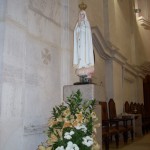This week I performed an ecclesiastic U-turn, formally coming back home to my Roman Catholic roots after a sojourn in the Anglican Communion. It’s not a journey I can explain–like many journeys that happen this time of year, including the completely inconvenient trek to Bethlehem described in the Gospel of Luke that kicked off the whole business. I have few regrets, but one of them is surrendering the sense of ownership that Anglicans worldwide (even renegade Episcopalians) feel toward the annual Festival of Nine Lessons and Carols that takes place on Christmas Eve in the Chapel of King’s College, Cambridge.
It’s not that Catholics don’t have lessons (the Anglican word for passages of Scripture read aloud at worship) and carols aplenty. But at this time of year, there is nothing, to my mind, that compares to the pure, sweet notes of the boy soprano who begins the King’s College service with the first verse of “Once in Royal David’s City.” A schola joins the soloist for the second verse. Then the full choir takes the third verse as they process into the candlelit chapel. Finally the organ adds fullness as the whole congregation joins in.
The hymn itself is no great masterpiece of hymnody. Its lyrics, from a children’s poem by the Victorian lady poet and bishop’s wife Cecil Frances Alexander (who also gave us “All Creatures Great and Small”) are, frankly, much egregious twaddle:
Once in royal David’s city
stood a lowly cattle shed,
where a mother laid her baby
in a manger for his bed:
Mary was that mother mild,
Jesus Christ her little child.
He came down to earth from heaven,
who is God and Lord of all,
and his shelter was a stable,
and his cradle was a stall;
with the poor, the scorned, the lowly,
lived on earth our Savior holy.
And, through all his wondrous childhood,
he would honor and obey,
love and watch the lowly maiden
in whose gentle arms he lay:
Christian children all must be
mild, obedient, good as he.
For he is our childhood’s pattern,
day by day like us he grew;
he was little, weak and helpless,
tears and smiles like us he knew.
and he feeleth for our sadness,
and he shareth in our gladness.
And our eyes at last shall see him,
through his own redeeming love;
for that Child who seemed so helpless
is our Lord in heaven above;
and he leads his children on
to the place where he is gone.
Not in that poor lowly stable,
with the oxen standing round,
we shall see him; but in heaven,
set at God’s right hand on high;
when like stars his children crowned,
all in white shall wait around.
But the effect is magical, as with all good liturgy. Check it out, from a 2008 TV broadcast:
When I listen to the live broadcast later today on NPR, I will be transported as always to Bethlehem. This year, however, I will no longer be an Anglican resident with an innkeeper’s proprietary air, but–like those others who took shelter in that lowly cattle shed–a citizen of the Roman world, just passing through. It’s good to be home, indeed, but I will always be grateful to my Anglican friends for the hospitality they showed me, once in royal David’s city.











